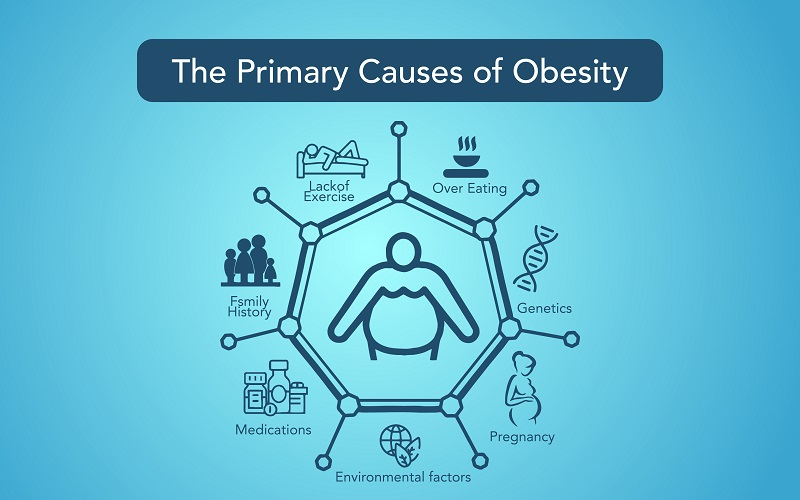Understanding the Causes of Obesity and Effective Solutions

Obesity has become a global health epidemic, affecting millions of people worldwide. While it’s important to embrace body positivity and not stigmatize those with excess weight, it’s equally crucial to address the underlying causes and provide practical solutions to combat obesity. In this blog, we will explore the various causes of obesity and offer effective strategies to help individuals achieve and maintain a healthy weight.
Causes of Obesity
1. Poor Diet :
One of the primary contributors to obesity is a poor diet. Consuming high-calorie, low-nutrient foods such as fast food, sugary beverages, and processed snacks can lead to weight gain over time. These foods are often loaded with added sugars, unhealthy fats, and excessive calories, making it easy to consume more energy than the body needs.
Solution: Adopting a balanced and nutritious diet is key to weight management. Focus on whole foods, such as fruits, vegetables, lean proteins, whole grains, and healthy fats. Portion control is also essential to avoid overeating.
2. Lack of Physical Activity :
Modern sedentary lifestyles, characterized by extended periods of sitting at desks or in front of screens, contribute to obesity. When physical activity is limited, the body burns fewer calories, making it easier to gain weight.
Solution: Incorporate regular physical activity into your daily routine. Aim for at least 150 minutes of moderate-intensity exercise or 75 minutes of vigorous-intensity exercise per week. Find activities you enjoy to make exercise a sustainable habit.
3. Genetics :
Genetics can play a role in obesity. Some individuals may have a genetic predisposition that makes it easier for them to gain weight, even when they eat relatively healthy diets.
Solution: While you can’t change your genetics, you can control your lifestyle choices. Focus on healthy eating and regular exercise to manage your weight effectively, regardless of your genetic predisposition.
4. Environmental Factors :
Obesogenic environments, characterized by easy access to unhealthy foods, limited opportunities for physical activity, and cultural factors that promote overeating, can contribute to obesity.
Solution: Advocate for healthier environments within your community and make conscious choices to avoid places or situations that encourage unhealthy behaviors. Create a supportive home environment that promotes healthy eating and active living.
5. Emotional Factors :
Emotional factors such as stress, depression, and boredom can lead to overeating and weight gain. People often turn to comfort foods as a coping mechanism.
Solution: Develop healthy coping strategies for dealing with emotions, such as stress management techniques, mindfulness, or seeking support from friends, family, or mental health professionals. Avoid using food as an emotional crutch.
6. Lack of Sleep :
Sleep deprivation can disrupt the body’s hunger hormones, leading to increased appetite and cravings for high-calorie foods.
Solution: Prioritize getting 7-9 hours of quality sleep each night. Establish a regular sleep schedule and create a comfortable sleep environment.
Conclusion
Obesity is a complex issue with multiple contributing factors. While genetics and some environmental factors are beyond our control, we can make positive changes in our lifestyle and behaviors to prevent and manage obesity effectively. By adopting a balanced diet, incorporating regular physical activity, managing stress, and seeking support when needed, individuals can take meaningful steps towards achieving and maintaining a healthy weight. Remember, it’s a journey that requires patience and commitment, but the rewards for your health and well-being are well worth it.






